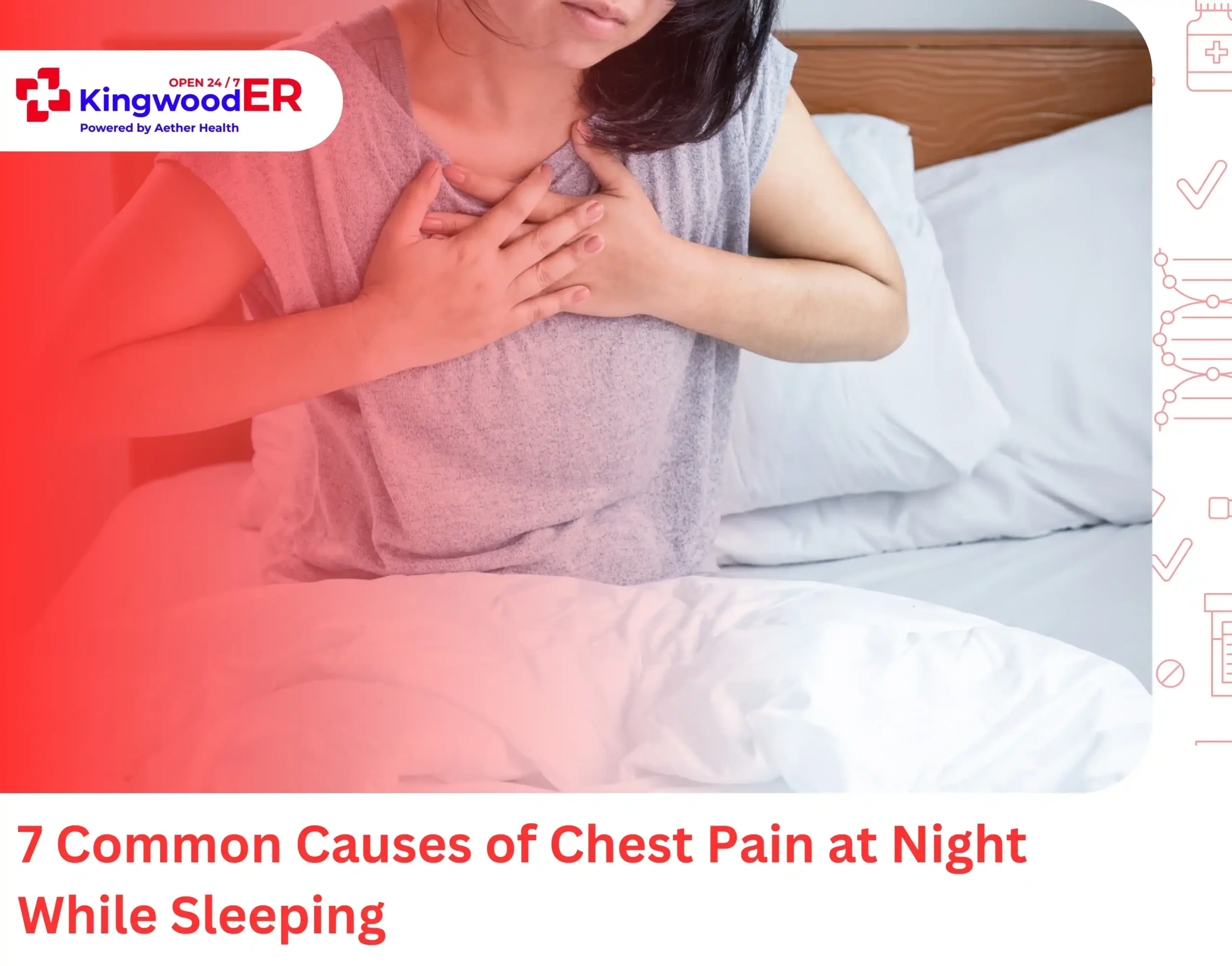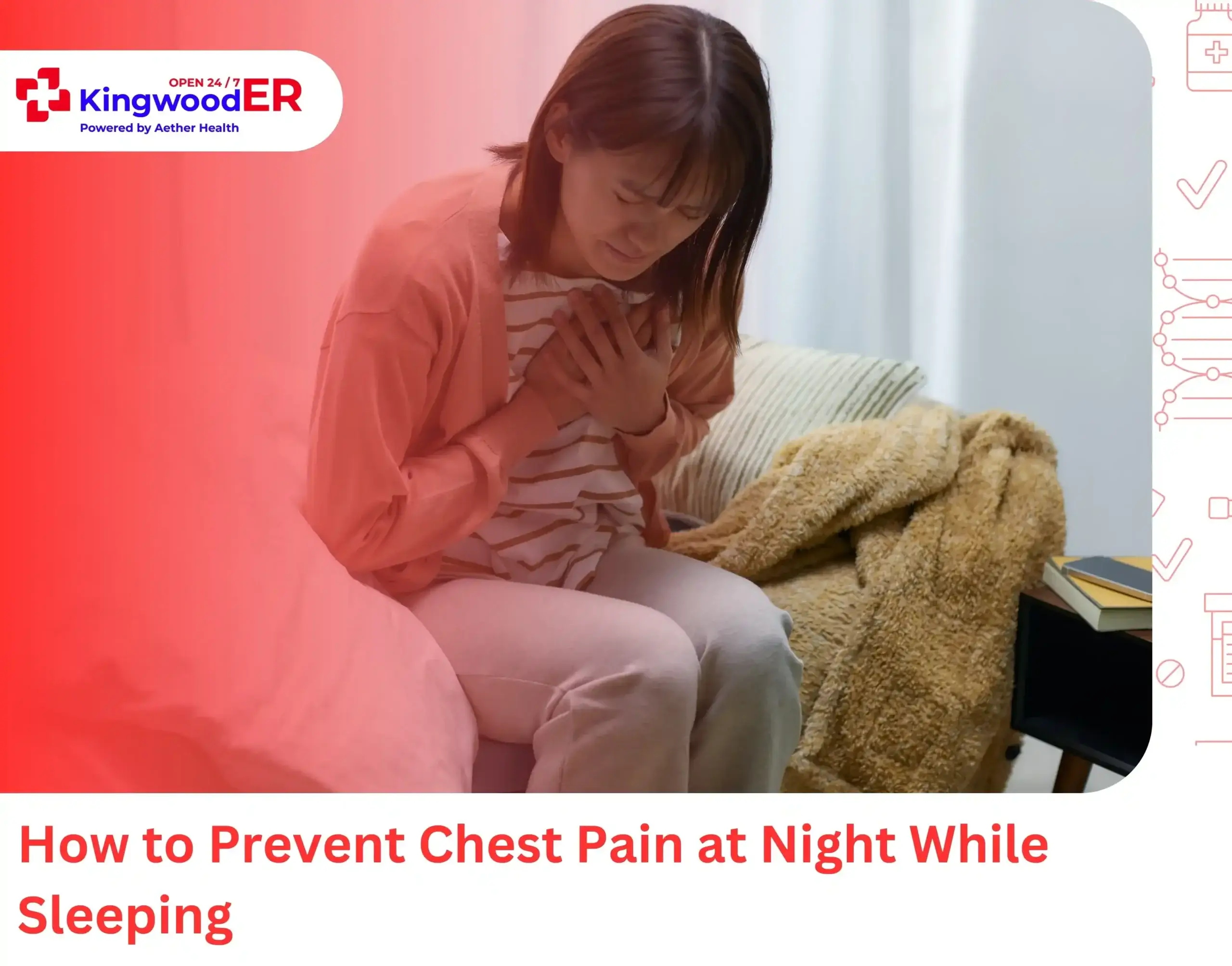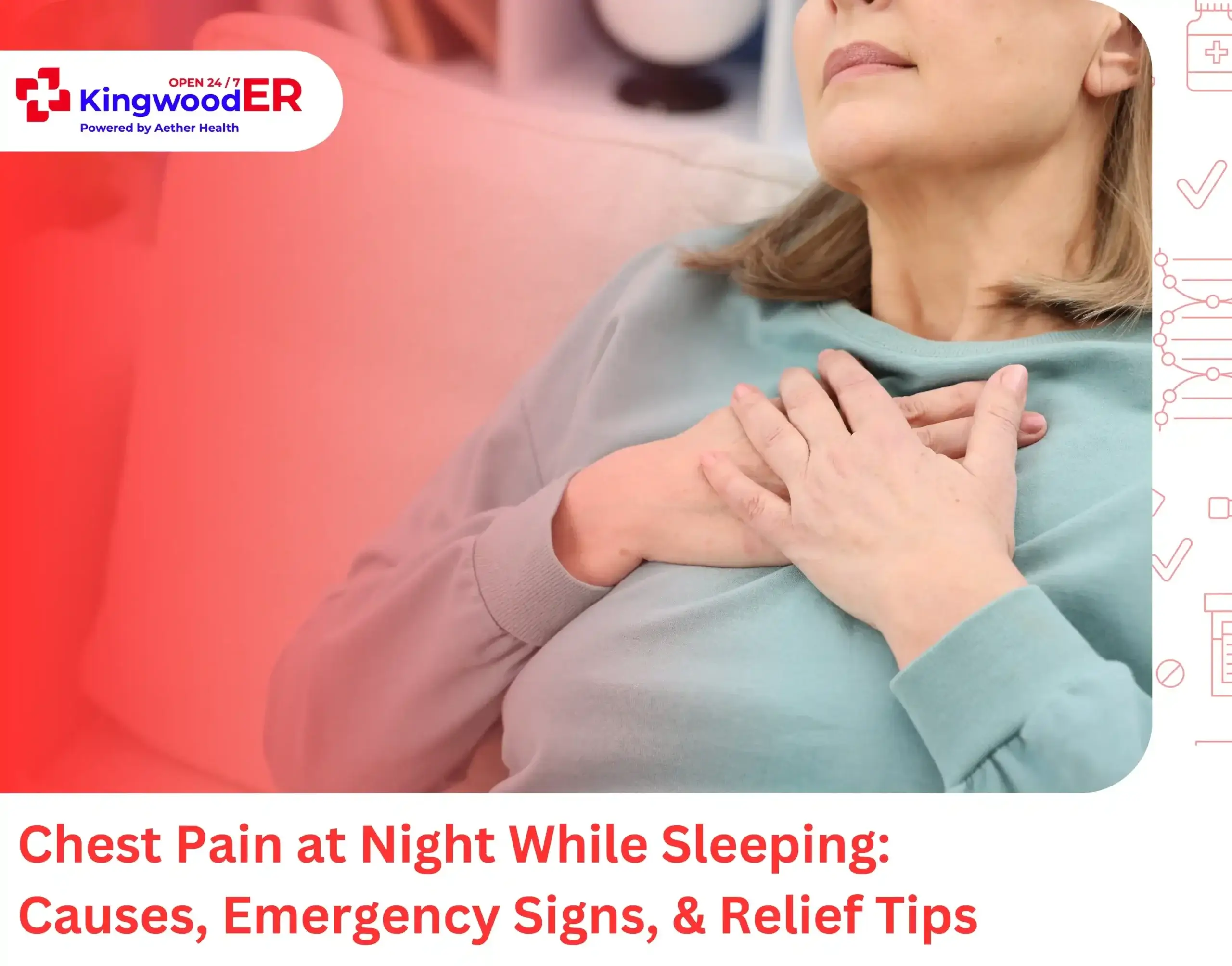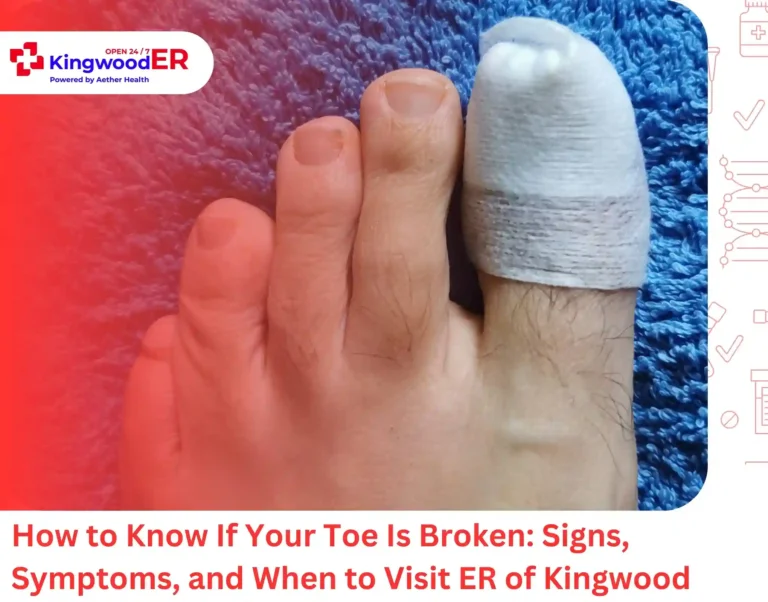Chest pain that wakes you from sleep is never normal. Pain at rest is often more concerning than pain during activity. Lying flat reduces blood flow to the heart and lungs, which can unmask hidden heart or lung problems.
Sometimes the cause may be harmless, such as acid reflux, muscle strain, or anxiety. But you should never ignore chest pain at night or day, especially if it is severe, comes with shortness of breath, or radiates to the arm, jaw, or back.
Let’s examine the common reasons for experiencing chest pain at night while sleeping and when to seek urgent care.
7 Common Causes of Chest Pain at Night While Sleeping

Chest pain at night while sleeping can be caused by acid reflux, heart issues, anxiety, strain, and pulmonary problems. Knowing what might be behind your symptoms can help you determine if you need rest, a change in habits, or an emergency room visit.
1. Heart-related Causes
Heart problems are one of the most concerning reasons for chest pain at night. Conditions like angina (reduced blood flow to the heart) or a heart attack can cause pressure, heaviness, or squeezing pain. Some people with heart failure also notice worsening symptoms at night, such as chest discomfort, trouble breathing, or waking up suddenly gasping for air.
If you can’t identify the cause of your chest pain, read our guide on how to tell the difference between a heart attack and regular chest pain.
2. Acid Reflux/GERD
Acid reflux, or gastroesophageal reflux disease (GERD), is a very common cause of chest pain at night. Lying flat allows stomach acid to move upward into the esophagus, creating a burning sensation that can be mistaken for chest pain. This discomfort often worsens after eating late dinners, spicy foods, or large meals before bedtime.
3. Anxiety, Stress, and Panic Attacks During Sleep
Even at night, anxiety and stress can trigger chest pain and chest tightness. Some people experience panic attacks during sleep, waking up with sudden chest tightness, a racing heartbeat, and shortness of breath. Though the pain is not caused by the heart itself, it can feel very similar.
4. Musculoskeletal Pain from Sleep Position or Strain
Sometimes, chest pain at night can originate from the muscles, joints, or ribs. Sleeping in an awkward position, straining chest muscles during the day, or having a mattress with poor support can lead to sharp, localized pain that worsens when moving or pressing on the affected area.
5. Sleep Apnea and Low Oxygen Levels
Obstructive sleep apnea can also cause nighttime chest pain. This condition interrupts breathing during sleep, reducing oxygen levels and putting extra strain on the heart and lungs. Over time, it increases the risk of high blood pressure, heart disease, and nighttime chest discomfort.
6. Lung or Pulmonary Causes
Some lung-related conditions can also cause chest pain at night. Asthma may flare up when lying down, leading to tightness in the chest. A pulmonary embolism (a blood clot in the lungs) is rare but dangerous and may cause sudden, sharp chest pain, especially if it worsens with breathing or is accompanied by shortness of breath.
7. Medication Side Effects that Worsen Nighttime Chest Pain
Certain medications, such as those used to treat blood pressure, asthma, or antibiotics, can irritate the esophagus or cause muscle aches, which may lead to chest discomfort at night. If you experience chest pain after starting a new prescription, consult your doctor.
How to Prevent Chest Pain at Night While Sleeping

Chest pain at night can feel unpredictable, but in many cases, small lifestyle changes can make a big difference. Here’s how you can reduce or even prevent the discomfort before it starts:
- Avoid heavy or late-night meals. Try to give your body at least two to three hours after eating before you go to bed.
- Limit triggers like caffeine, alcohol, and spicy foods. These can make acid reflux and heartburn worse.
- Elevate your head while sleeping. Using an extra pillow or a wedge can help keep acid from moving back into your esophagus.
- Maintain a healthy weight. Extra weight increases pressure on the stomach and heart, raising the risk of reflux and sleep apnea.
- Manage stress and anxiety. Relaxation techniques like deep breathing, meditation, or gentle stretching before bed can help prevent chest pain related to anxiety.
- Stay active during the day. Regular exercise is good for your heart and can help you sleep better at night.
- Follow your doctor’s advice for any existing conditions. Be sure to take prescribed medications for reflux, asthma, blood pressure, or heart problems as directed.
How to Tell If Nighttime Chest Pain Is an Emergency

Not all chest pain while sleeping is life-threatening, but some symptoms mean you should call 911 or go to the ER immediately.
Red Flags of Nighttime Chest Pain
- Pressure, squeezing, or heaviness in the chest
- Pain that spreads to the arm, shoulder, jaw, or back
- Shortness of breath, even at rest or when lying flat
- Sudden dizziness, fainting, or confusion
- Cold sweats or nausea/vomiting
- Chest pain that lasts more than a few minutes or keeps coming back
- Sharp chest pain that worsens when breathing (possible lung problem)
Final Thoughts
You can’t always tell at home if chest pain is from reflux or a serious heart issue. That’s why it’s so important to go to the nearest emergency room if you experience chest pain at night.
You’ll find the ER Kingwood team available 24/7, ready to help in the middle of the night. With onsite testing and imaging, our emergency physicians can quickly determine whether your chest pain is something minor or an emergency.
Even if the tests later show nothing life-threatening, it’s always safer to be checked.
FAQs
1. Why do I get chest pain when lying down at night?
Chest pain at night often happens because lying flat can make conditions like acid reflux, heart problems, or sleep apnea worse. In some cases, the chest muscles may ache due to poor sleep posture. However, recurring or severe pain should always be checked by a doctor.
2. Can acid reflux cause chest pain at night while sleeping?
Yes, Acid reflux (GERD) is one of the most common causes of chest pain at night. When you lie down, stomach acid can flow back into the esophagus, causing a burning or pressure sensation in the chest that may feel similar to heartburn or heart pain.
3. How do I know if nighttime chest pain is serious?
Chest pain can be a serious symptom if accompanied by shortness of breath, dizziness, nausea, sweating, or pain spreading to the arm, jaw, or back. These may signal a heart attack or another emergency.
4. What’s the difference between heartburn and a heart attack at night?
Heartburn typically feels like a burning or sour sensation that worsens after eating and improves with the use of antacids. A heart attack typically causes pressure, heaviness, or squeezing pain that doesn’t improve with position changes or antacids, and may come with other symptoms like sweating, nausea, or radiating pain.
5. How can I stop chest pain that wakes me up?
For acid reflux, try elevating your head, avoiding late meals, or taking antacids as needed. For anxiety, slow breathing and relaxation techniques may help. If your pain is severe, new, or does not go away, do not try to treat it at home. Get emergency care right away.




